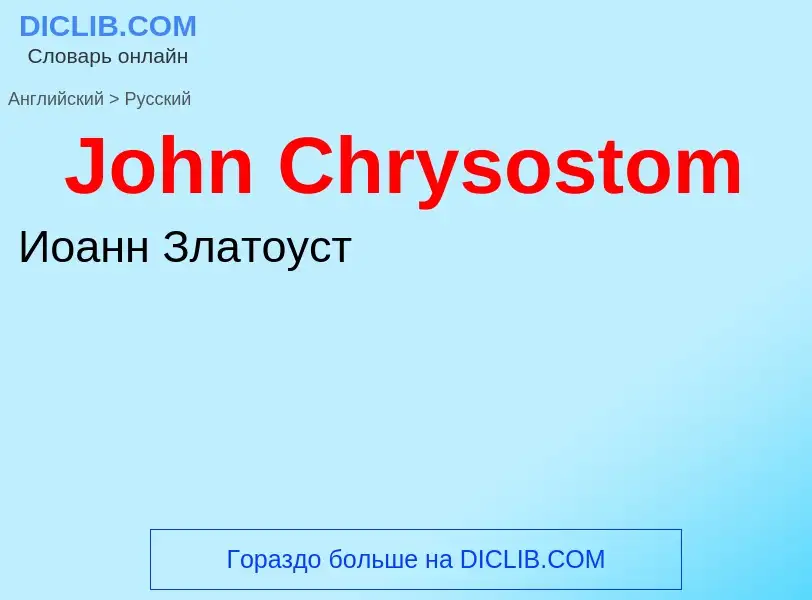ترجمة وتحليل الكلمات عن طريق الذكاء الاصطناعي ChatGPT
في هذه الصفحة يمكنك الحصول على تحليل مفصل لكلمة أو عبارة باستخدام أفضل تقنيات الذكاء الاصطناعي المتوفرة اليوم:
- كيف يتم استخدام الكلمة في اللغة
- تردد الكلمة
- ما إذا كانت الكلمة تستخدم في كثير من الأحيان في اللغة المنطوقة أو المكتوبة
- خيارات الترجمة إلى الروسية أو الإسبانية، على التوالي
- أمثلة على استخدام الكلمة (عدة عبارات مع الترجمة)
- أصل الكلمة
John Chrysostom - ترجمة إلى الروسية
['krisəstəm]
существительное
общая лексика
красноречивый оратор
религия
Златоуст
ويكيبيديا

John Chrysostom (; Greek: Ἰωάννης ὁ Χρυσόστομος; Ge'ez :ቅዱስ ዮሐንስ አፈወርቅ c. 347 – 14 September 407) was an important Early Church Father who served as archbishop of Constantinople. He is known for his preaching and public speaking, his denunciation of abuse of authority by both ecclesiastical and political leaders, his Divine Liturgy of Saint John Chrysostom, and his ascetic sensibilities. The epithet Χρυσόστομος (Chrysostomos, anglicized as Chrysostom) means "golden-mouthed" in Greek and denotes his celebrated eloquence. Chrysostom was among the most prolific authors in the early Christian Church, although both Origen of Alexandria and Augustine of Hippo exceeded Chrysostom.
He is honoured as a saint in the Oriental Orthodox, Eastern Orthodox, Catholic, Anglican, and Lutheran churches, as well as in some others. The Eastern Orthodox, together with the Byzantine Catholics, hold him in special regard as one of the Three Holy Hierarchs (alongside Basil the Great and Gregory of Nazianzus). The feast days of John Chrysostom in the Eastern Orthodox Church are 14 September, 13 November and 27 January. In the Roman Catholic Church he is recognized as a Doctor of the Church. Because the date of his death is occupied by the feast of the Exaltation of the Holy Cross (14 September), the General Roman Calendar celebrates him since 1970 on the previous day, 13 September; from the 13th century to 1969 it did so on 27 January, the anniversary of the translation of his body to Constantinople. Of other Western churches, including Anglican provinces and Lutheran churches, some commemorate him on 13 September, others on 27 January. John Chrysostom is honored on the calendars of the Church of England and the Episcopal Church on 13 September. The Coptic Church also recognizes him as a saint (with feast days on 16 Thout and 17 Hathor).


![anti-clerical painting]] by [[Jean-Paul Laurens]] anti-clerical painting]] by [[Jean-Paul Laurens]]](https://commons.wikimedia.org/wiki/Special:FilePath/Augustins - Saint Jean Chrysostome et l'Impératrice Eudoxie - Jean Paul Laurens 2004 1 156.jpg?width=200)
![conch]] mosaic of John Chrysostom from the south-east apse of the [[nave]] of the [[Hosios Loukas]] monastery conch]] mosaic of John Chrysostom from the south-east apse of the [[nave]] of the [[Hosios Loukas]] monastery](https://commons.wikimedia.org/wiki/Special:FilePath/Hosios Loukas (nave, south east conch) - John Chrysostom - detail.jpg?width=200)
![[[Byzantine]] 11th-century [[soapstone]] [[relief]] of John Chrysostom, [[Louvre]] [[Byzantine]] 11th-century [[soapstone]] [[relief]] of John Chrysostom, [[Louvre]]](https://commons.wikimedia.org/wiki/Special:FilePath/John Chrysostom Louvre OA3970.jpg?width=200)
![''The Penance of St. John Chrysostom''. Engraving by [[Lucas Cranach the Elder]], 1509. The saint can be seen in the background on all fours, whilst the princess and their baby dominate the foreground. ''The Penance of St. John Chrysostom''. Engraving by [[Lucas Cranach the Elder]], 1509. The saint can be seen in the background on all fours, whilst the princess and their baby dominate the foreground.](https://commons.wikimedia.org/wiki/Special:FilePath/Lucas Cranach the Elder - The Penance of St. John Chrysostom.jpg?width=200)
![The return of the relics of Saint John Chrysostom to the [[Church of the Holy Apostles]] in [[Constantinople]] The return of the relics of Saint John Chrysostom to the [[Church of the Holy Apostles]] in [[Constantinople]]](https://commons.wikimedia.org/wiki/Special:FilePath/Menologion of Basil 061.jpg?width=200)
![The Byzantine emperor [[Nicephorus III]] receives a book of homilies from John Chrysostom; the [[Archangel Michael]] stands on his left (11th-century illuminated [[manuscript]]). The Byzantine emperor [[Nicephorus III]] receives a book of homilies from John Chrysostom; the [[Archangel Michael]] stands on his left (11th-century illuminated [[manuscript]]).](https://commons.wikimedia.org/wiki/Special:FilePath/Nicephorus III and chrysostome BnF Coislin79 fol2v.jpg?width=200)
![Saint Patrick's Cathedral]], New York City Saint Patrick's Cathedral]], New York City](https://commons.wikimedia.org/wiki/Special:FilePath/St.Patrick's Cathedral NYC2.jpg?width=200)
![John Chrysostom with [[Basil of Caesarea]] and [[Gregory of Nazianzus]] on a late-15th-century icon of the [[Three Holy Hierarchs]] from the [[Cathedral of St Sophia, Novgorod]] John Chrysostom with [[Basil of Caesarea]] and [[Gregory of Nazianzus]] on a late-15th-century icon of the [[Three Holy Hierarchs]] from the [[Cathedral of St Sophia, Novgorod]]](https://commons.wikimedia.org/wiki/Special:FilePath/Three Holy Hierarchs (Novgorod).jpg?width=200)

![Capetian]] holdings in France. Blue: French royal domains,
Green: Fiefs held on behalf of the French crown,
Yellow: Church lordships,
Red: Fiefs held on behalf of the English crown Capetian]] holdings in France. Blue: French royal domains,
Green: Fiefs held on behalf of the French crown,
Yellow: Church lordships,
Red: Fiefs held on behalf of the English crown](https://commons.wikimedia.org/wiki/Special:FilePath/English and French holdings 1180-1223.png?width=200)
.jpg?width=200)
![A [[silver]] King John [[penny]] A [[silver]] King John [[penny]]](https://commons.wikimedia.org/wiki/Special:FilePath/John penny.jpg?width=200)
![stag hunt]] stag hunt]]](https://commons.wikimedia.org/wiki/Special:FilePath/King John hunting - Statutes of England (14th C), f.116 - BL Cotton MS Claudius D II.jpg?width=200)
